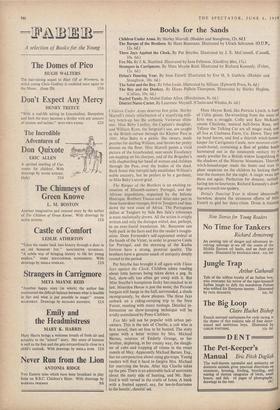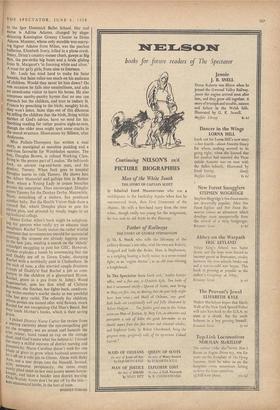Books for the Sands
Children Under Arms. By Shirley Murrell. (Hodder and Stoughton, 12s. 6d.) The Barque of the Brothers. By Hans Baumann. Illustrated by Ulrich Schramm. (O.U.P.,
12s. 6d.)
Three Jays Against the Clock. By Pat Smythe. Illustrated by J. E. McConnell. (Cassell,
10s. 6d.)
Fox Me. By J. K. Stanford. Illustrated by Jane Fellowes. (Geoffrey Bles, 15s.) Strangers in Carrigmore. By Meta Mayne Reid. Illustrated by Richard Kennedy. (Faber,
12s. 6d.)
Drina's Dancing Year. By Jean Estoril. Illustrated by Eve M. S. Guthrie. (Hodder and
Stoughton, 10s. 6d.)
The Saint and the Boy. By John Leale. Illustrated by Sillince. (Epworth Press, 8s. 6d.) The Boy and the Donkey. By Diana Pullein-Thompson. Illustrated by Shirley Hughes.
(Collins, 10s. 6d.)
Rachel Tandy. By Mabel Esther Allan. (Hutchinson, 8s. 6d.) District Nurse Carter. By Laurence Meynell. (Chatto and Windus, 8s. 6d.)
Children Under Arms deserves first prize. Shirley Murrell's timely resurrection of a stupefying mili- tary botch-up has the authentic Victorian shim- mer. Miss Baby Lindley, the Captain's daughter, and William Ryan, the Sergeant's son, are caught in the British retreat through the Khyber Pass in 1841. Miss Baby is a pickle. She swears, steals peaches for darling William, and throws her pretty dresses on the floor. Miss Murrell paints a vivid picture of the boneheaded, near-senile Excellency cat-napping on his charpoy, and of the Brigadier's wife shepherding her band of women and children through the Pass, over the bodies of the dead. Back home this intrepid lady establishes William's noble ancestry, but he prefers to be a gardener, to Miss Baby's secret grief.
The Barque of the Brothers is an exciting re- creation of fifteenth-century Portugal, and her African expeditions, organised by the Infante Henrique. Brothers Tinoco and Aires take part in these hazardous voyages, first to Tangiers and then down the west coast of Africa. The Portuguese defeat at Tangiers by Sala Ben Sala's tribesmen is most realistically drawn. All the action is crisply written and only the dialogue stilted, due, perhaps, to an over-literal translation. Mr. Baumann can both pack in the facts and fire the reader's imagin- ation. Dom Fernando's self-appointed ordeal at the hands of the Vizier, in order to preserve Ceuta for Portugal, and the storming of the Kasba fortress have a strong, pictorial quality. The brothers have a genuine touch of antiquity deeply rooted in the period.
Pat Smythe has brought it off again with Three Jays against the Clock. Children adore reading about little horrors being taken down a peg. In fact, show-offs too often get away with it. But Miss Smythe's bumptious Jacky has mucked in at last. Miserden House is just the same; the Picasso bargain still hangs in the hall, surrounded, a shade incongruously, by show plaques. The three Jays embark on a riding-camping trip to the New Forest, meeting with many mishaps. Detailed in- formation on show-jumping technique will be avidly assimilated by Pony-Clubbers.
Fox Me will not be popular with urban pet- owners. This is the tale of Charlie, a cub who is first tamed, then set free to be hunted. The story opens with a letter written by Mrs. Michael Barnes, mistress of Enderly Grange, to her brother, deploring, in her county way, the slaugh- ter of cubs and trapping of vixens in the sweet month of May. Apparently Michael Barnes, Esq., has no compunction about using gin-traps. Young readers will find it hard to forgive Mrs. Michael for marrying the brute. After this Charlie takes up the pen. There is an admirable lack of sentiment about the nasty side of hunting, and Mr. Stan- ford is well versed in the crafts of foxes. A book with a limited appeal; say, for ten-to-fourteens in the huntin', shootin' set:
Meta Mayne Reid, like Patricia Lynch, is fond of Celtic gauze. De-wreathing from the mists of Erin was a struggle. Colly and Kay McKean, cousin Charlotte, musical half-Swiss Rosa, and Tiffany the Talking Cat are all magic mad, and all live at Coolnean Farm, Co. Down. They bite up hazel leaves, and find a thievish witch-house- keeper for Carrigmore Castle, now museum-cunt youth-hostel, containing a fleet of golden boats hammered out in the nineteenth century by a needy jeweller for a British widow languishing to the shadows of the Mourne Mountains. Thievish witch-housekeeper steals the boats and tries to plant suspicion on the children by locking theca into the museum for the night. A magic swan lets them out again. Perfection for dreamy, netball hating ten-to-fourteens. Richard Kennedy's draw ings are much too spidery.
Drina's Dancing Year is almost abnormally harmless, despite the strenuous efforts of Miss Estoril to gild her daisy-chain. Drina is training at the Igor Dominick Ballet School. Her real name is Adrina Adamo, changed by dago- detesting Kensington Granny Chester to Drina Adams. Mummy, whose only stumble was marry- ing Signor Adamo from Milan, was the peerless ballerina, Elizabeth Ivory, killed in a plane crash. Jenny, Drina's country-mouse chum, gawps at Big Ben, the pre-strike big buses and a bride gliding from St. Margaret's 'in foaming white and silver.' A treat for girly girls, from nine to fourteen.
Mr. Leale has tried hard to make his Saint lovable, but Saint relies too much on his audience of children. Would they never let him down? On one occasion he falls into unsaintliness, and asks an unwelcome visitor to leave his house. He also composes namby-pamby hymns that no one can stomach but the children, and tries to imitate St. Francis by preaching to the birds; naughty birds, they won't listen. Saint slips out of this dilemma by telling the children that the birds, living within earshot of God's advice, have no need for his. Soothing reading for rather passive eight-to-tens, though the older ones might spot some cracks in the moral structure. Illustrations by Sillince, after Ardizzone.
Miss Pullein-Thompson has written a neat story, as unoriginal as semolina pudding and a cast-iron favourite for Wimbledon nannies. The boy, Douglas Brown, is refined Working Class, living in 'the poorer part of London.' He befriends Jock, an ancient rag-and-bone man, and his donkey, Tammy. When Jock goes to hospital Douglas learns to ride Tammy. He shows him the Albert Memorial and gallops him in Rotten ROW, where a Young Lady in cream breeches praises his enterprise. Thus encouraged, Douglas enters Tammy for the Donkey Derby. Meanwhile, Mum, something of a slattern, has produced another baby. But the Health Visitor finds them a council flat, where Douglas plans to pass his eleven plus, and proceed by steady stages to an agricultural college. Mabel Esther Allen's book might be enlighten- ing for parents who really try to educate their daughters. Rachel Tandy makes the rather wistful comment that seventeens are too old for secretarial training; the sixteens are already tapping away in the best jobs, stealing a march on the 'elderly' schoolgirl struggling to pass her GEC. However, Mother explodes a bomb by announcing that she and Daddy are off to Down Under, dumping .Rachel with a mothbally aunt in Cheltenham. In the nick of time, a chic married couple (business friends of Daddy's) find Rachel a job as cm- Pantos to the children of a glamorised Blyton. Rachel, green as a pea from St. John's Wood Supermarket, gets her first whiff of Chiltern 13 ohemia; she flinches, but fights back, condemn- ing vvriter-mother's scarlet slacks as too youthful (she has grey curls). The odiously fey children, hose ponies are named after wild 'flowers, mock Rachel for not recognising Old Man's Beard. But they loath Mother's books, which is their saving grace.
Picked District Nurse Carter for review from
a searing curiosity about the eye-compelling girl on the wrapper; not an errant curl beneath the trim velour; hand raised to rap on the cottage (1.,°0, and God knows what lies behind it! 1 found tne story a skilful mixture of district nursing and domesticity. Nurse Caroline doesn't wait for one he' of grass to grow when husband announces te s off on a solo job to Ghana. Alone with Baby Ann, not a tear drops into the Nescafe. Instead, with awesome perspicacity, she turns mopy n _wly jilted sister-in-law into jaunty nanny-house- keeper -- Per, and takes a header into district nursing. ''cle-Worlde Aunts don't be put off by the title o n-anatomical births, in the best of taste.
BRIDGET TISDALL











































 Previous page
Previous page